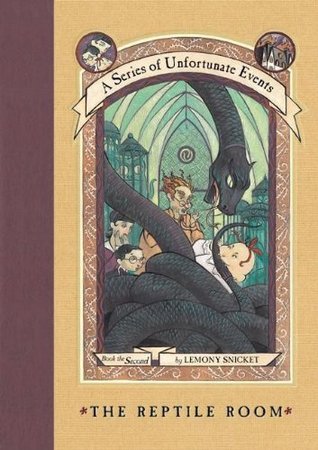More on this book
Community
Kindle Notes & Highlights
Read between
April 8 - April 9, 2025
I am sorry to tell you that this story begins with the Baudelaire orphans traveling along this most displeasing road, and that from this moment on, the story only gets worse.
Violet was an inventor, and when she was thinking up inventions she liked to tie her hair up this way. It helped her think clearly about the various gears, wires, and ropes involved in most of her creations.
Occasionally, people thought that because the orphans were unfortunate, they were also dim-witted.
“Now, Klaus, don’t ask too many questions right away. Violet, what happened to the ribbon in your hair? I thought you looked very distinguished in it. And somebody please make sure Sunny doesn’t bite Dr. Montgomery. That wouldn’t be a good first impression.”
One of the most difficult things to think about in life is one’s regrets. Something will happen to you, and you will do the wrong thing, and for years afterward you will wish you had done something different.
If only the Baudelaire parents were still alive, the youngsters wouldn’t even have heard of Count Olaf, let alone have him settling into their home and undoubtedly making evil plans.
Uncle Monty was so wrong about Stephano, in thinking he was a herpetological spy rather than Count Olaf, that the three siblings could scarcely think of a way to tell him so.
“Tadu,” Sunny murmured solemnly, which probably meant something along the lines of “It’s a loathsome situation in which we find ourselves.”
Even though the dark room felt mysterious and strange, it was a comforting mystery, and a safe strangeness.
It seemed incredible that their very lives hinged on a carpooling conversation, but in life it is often the tiny details that end up being the most important.
What happens in a certain place can stain your feelings for that location, just as ink can stain a white sheet.
Klaus sighed, and opened a book, and as at so many other times when the middle Baudelaire child did not want to think about his circumstances, he began to read.
If one’s safety is threatened, one often finds courage one didn’t know one had, and the eldest Baudelaire found she could be brave enough to open the door.
But here, in Stephano’s inner sanctum at Uncle Monty’s house, all Violet could find were signs of uncleanliness.
The story’s moral, of course, ought to be “Never live somewhere where wolves are running around loose,” but whoever read you the story probably told you that the moral was not to lie. This is an absurd moral, for you and I both know that sometimes not only is it good to lie, it is necessary to lie.
Sometimes even in the most unfortunate of lives there will occur a moment or two of good fortune.
“This is not a game, you horrible man,” Mr. Poe said. “Dominos is a game. Water polo is a game. Murder is a crime, and you will go to jail for it.
“You shouldn’t tell lies, orphans,” Count Olaf said. “I don’t think you are in a position to give moral lectures to children, Olaf,” Mr. Poe said sternly. “All right, Dr. Lucafont, you take him.”
It meant that even in the bleak circumstances of their current situation, even throughout the series of unfortunate events that would happen to them for the rest of their lives, Uncle Monty and his kindness would shine in their memories. Uncle Monty was brilliant, and their time with him was brilliant.


